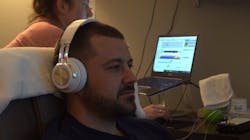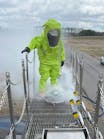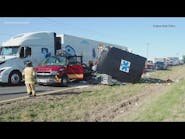Neurofeedback Helps CO Firefighters Cope with Job Stress
By Shelly Bradbury
Source The Denver Post
With wires stuck to his head and a stuffed toy monkey in his arms, Brian McCoy heaved a deep breath as he settled into a reclining chair at South Metro Fire Rescue’s headquarters in Centennial.
He slipped on headphones, put up his feet and watched as a TV screen played scenes from under the sea: dolphins twirling, seaweed swirling, sharks prowling.
Behind him, neurofeedback clinician and therapist Gabi Whitmer tracked his brain activity.
When McCoy’s brain calmed, the music in his headphones got louder, the image on the screen got bigger and the monkey vibrated — positive feedback that, over time, helps his brain relearn how to react to stimulation, which in turn helps relieve McCoy’s symptoms of post-traumatic stress disorder, trauma and burnout.
This so-called “brain training” changed McCoy’s life.
McCoy, an EMS district supervisor, is one of about 50 people at South Metro Fire Rescue to try the therapy, which has become so popular that the fire district in January brought Whitmer in full time to hold sessions on site at its headquarters.
“Especially with this population, we see a ton of people where the brain is always on, always ready to go,” Whitmer said. “Which makes them really, really good at their jobs, but it makes it harder to downshift and kind of rest, relax.”
Before starting neurofeedback a year ago, McCoy couldn’t sleep more than a couple hours a night. He was drinking too much, isolating himself from those around him and considering suicide.
“Spent a couple of nights with a pistol in my mouth,” he said.
Last year, at least 116 firefighters and 19 paramedics died by suicide in the United States, according to the Firefigher Behavioral Health Alliance, a Missouri nonprofit. Founder Jeff Dill believes those reported numbers are only about 40 percent of the total suicides. So far in 2020, at least 13 firefighters and one paramedic have died by suicide, he said.
A former firefighter and current counselor, Dill said Tuesday that some of the pressures on first responders are due to “cultural brainwashing.”
“When we put this uniform on, we are expected to act a certain way: strong, brave, sacrificing,” he said. “When you are expected to act in that manner and not show any weakness, and then you are challenged both in your professional and personal life, it’s pretty damn difficult.”
McCoy had unwelcome, racing thoughts that dashed around in his head like a golden retriever puppy, he said. He couldn’t focus on reading books; he’d read a page, turn to the next, and have no idea what he’d just read. At night, the smallest shift in light or sound kept him from sleeping.
“I don’t just stir, I get up. I’m done for the night,” he said. “Professionally it is a great thing. I can wake up to tones for a call and I can be in a vehicle navigating in two minutes and working through a critical medical situation in under eight from a dead sleep; but then my mind is switched on to that activity level for the rest of the day.”
The symptoms started around 2015, but McCoy didn’t recognize the problem for a while, and didn’t talk about his increasing daily struggle to function with anyone.
“I really thought if, as a culture, if you have PTSD, or you’ve been suicidal, you’re going to be unemployable,” he said. “I’m not going to be able to feed my family. So I hid it for a very long time because of that.”
Then one day, he made a flippant comment to a longtime friend who was a paramedic — my divorce is over and I’m not thinking about killing myself so I must be OK — and his friend took it seriously and urged him to get help.
After receiving ketamine therapy for a month and going through a year of neurofeedback sessions, McCoy is sleeping again. He can read for an hour at a time, and he’s dreaming for the first time in years. He never had to take any medication, which had been recommended to him in the past but was something he wanted to avoid because of possible side effects.
“Beyond getting my life back, that’s a huge gift,” he said.
McCoy has started talking candidly with his colleagues about his experiences — and theirs — and he’s passionate about guiding other people to help.
South Metro Fire Rescue brought neurofeedback into its headquarters this year in an attempt to both normalize it and make it more accessible, said Chris Macklin, wellness coordinator at South Metro Fire and Rescue.
The neurofeedback therapy is one of several tools the district is using to address mental health among its employees, Macklin said, including traditional licensed counselors and eye movement desensitization and reprocessing.
Although she’s only been working from South Metro’s headquarters for couple months, Whitmer is already considering adding a second room and perhaps bringing another clinician on board.
“The response,” she said, “has been overwhelming.”
———
©2020 The Denver Post
Visit The Denver Post at www.denverpost.com
Distributed by Tribune Content Agency, LLC.






